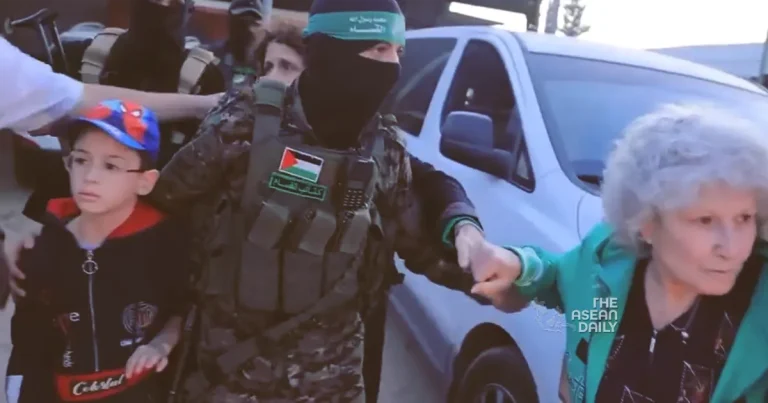25-11-2023 (GAZA) Hamas fighters released 24 hostages on November 24th, marking the first day of the war’s initial truce. Among those liberated were Israeli women, children, and Thai farm workers, a moment of relief as the guns fell silent across the Gaza Strip for the first time in seven weeks.
The hostages, including 13 Israelis, some with dual nationality, 10 Thais, and a Filipino, were transferred out of Gaza and handed over to Egyptian authorities at the Rafah border crossing. The International Committee of the Red Cross (ICRC) played a crucial role, with eight staff members accompanying the hostages in a four-car convoy.
Prime Minister Benjamin Netanyahu expressed gratitude for the safe return of the hostages, emphasizing the commitment to bring back all those held captive. The released Israeli hostages included children, mothers, and elderly women, each reuniting with their families after enduring weeks of uncertainty.
Medical assessments were conducted on the released hostages within Israeli territory before they were reunited with their families in hospitals. Under the terms of the four-day Israel-Hamas truce, 50 women and children hostages were released in exchange for 150 Palestinian women and children held in Israeli jails. Israel indicated the possibility of extending the truce if more hostages were released at a rate of 10 per day.
The release on November 24th involved swapping 24 jailed Palestinian women and 15 teenagers for the hostages. Interestingly, the freedom of Thai workers, who were all men, was unrelated to the truce talks and followed a separate track mediated by Egypt and Qatar. These workers, along with Filipino farm workers, were initially taken to Gaza by gunmen during a violent episode on October 7th.
US President Joe Biden acknowledged the real chance of extending the truce and highlighted the critical opportunity it presented to deliver humanitarian aid into Gaza. Germany’s Foreign Minister Annalena Baerbock emphasized the need for the ceasefire to last as long as possible to ensure the delivery of vital goods to the people of Gaza.
The pause in fighting on November 24th marked the first time in seven weeks that combat between Israeli troops and Hamas fighters came to a halt. While both sides accused each other of sporadic shootings and violations, no major bombings, artillery strikes, or rocket attacks were reported.
In Gaza, people cautiously ventured out of their homes and shelters, facing a landscape of buildings reduced to rubble in areas like Khan Younis. Displaced families carried their belongings in plastic bags, hopeful for a temporary return to the homes they had abandoned.
Columns of Israeli tanks rolled away from the northern end of the Gaza Strip, and aid trucks entered from Egypt at the southern end. The UN humanitarian office (OCHA) reported the offloading of 137 trucks of goods in Gaza on that day, constituting the most extensive humanitarian convoy since October 7th.
Hamas confirmed a cessation of hostilities from its forces, but the spokesman for Hamas’ armed wing, Mr Abu Ubaida, described it as a “temporary truce” and called for an “escalation of the confrontation on all resistance fronts,” including the Israeli-occupied West Bank. Israeli Defence Minister Yoav Gallant echoed a similar sentiment, indicating that the pause would be short-lived, and the conflict would resume with great intensity.
BREAKING: Hamas has released the first hostages. Watch as a convoy of Red Cross vehicles transports hostages through Gaza towards Egypt.
We are following this closely. Watch this space for our coverage as the situation develops. pic.twitter.com/aPogkXnp9D
— GZERO Media (@gzeromedia) November 24, 2023
According to Israeli tallies, the conflict, which began with Hamas fighters crossing into southern Israel on October 7th, resulted in 1,200 deaths and the seizure of about 240 hostages. Israel responded with a series of bombings in the Hamas-ruled enclave, causing the death of approximately 14,000 Gazans, with around 40% being children, according to Palestinian health authorities.
The conflict forced hundreds of thousands of Gaza’s 2.3 million people to flee their homes, particularly in the northern half of the enclave. Residents reported warnings from Israelis not to return to the north, and there were instances of firing over the heads of people attempting to re-enter Gaza City, which Israel had ordered evacuated and subsequently targeted in its ground assault.
Mr James Elder, spokesman for the UN children’s agency Unicef, appealed for the truce to become permanent, stressing the moral imperative to prevent a return to violence against children after the temporary pause.




